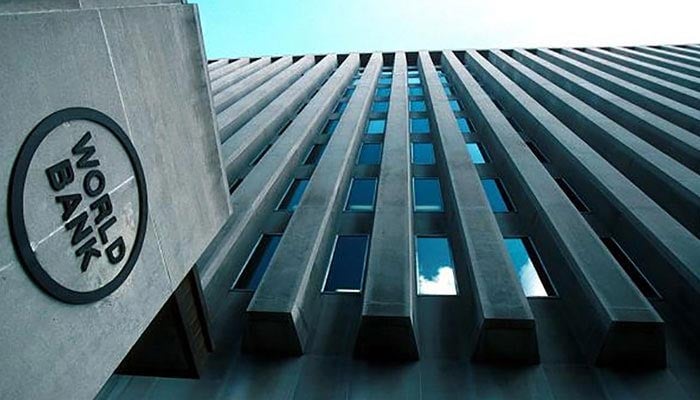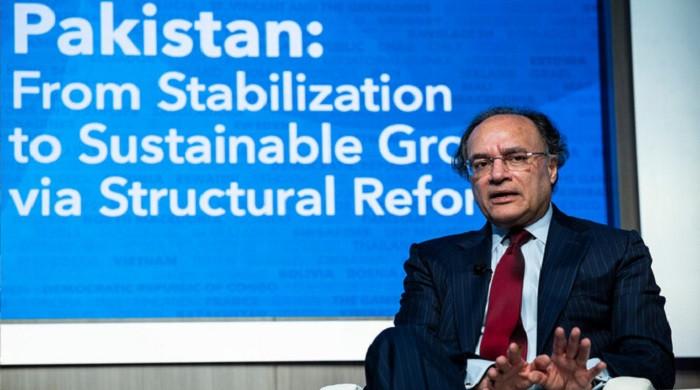Pakistan requires $348 billion of GDP for climate challenges
World Bank says climate change-induced disasters could significantly set back Pakistan’s development ambitions and its ability to reduce poverty
November 11, 2022

- Pakistan needs $348bn or 10.7% of GDP in next eight years.
- Carbon tax could be beneficial to Pakistan's development.
- Climate change disasters could set back Pakistan’s development ambitions: WB.
ISLAMABAD: While recommending the government to slap carbon tax, the World Bank assessed that Pakistan required a total investment of $348 billion or 10.7% of GDP in the next eight years for a comprehensive response to climate and development challenges.
A World Bank Group’s report titled “Country Climate and Development Report (CCDR) for Pakistan" released on Thursday stated that the total investment needed for a comprehensive response to Pakistan's climate and development challenges between 2023 and 2030 amounts to around $348 billion (or 10.7% of cumulative GDP). This consists of $152 billion for adaptation and resilience and $196 billion for deep decarbonisation.
This figure is enormous in comparison with the historic average annual development budget at the federal and provincial levels and currently available finance, which was roughly $11 billion per annum between 2011/2012 and 2014/2015.
However, the need for adaptation and resilience is likely an underestimation due to the unavailability of data on investment needs for key transformations, such as the sustainable agri-food system, flood risk management plan, shock-responsive social protection system, and climate-resilient rural connectivity. These estimates suggest a significant climate and development gap, for which a number of tangible solutions can be proposed to start bridging it.
An illustrative assessment based on a retrospective review of the level of funding in recent years suggests that the current financing composition available over the next decade can be estimated to be around $39 billion from public finance (including MDB financing) and $9 billion from public-private partnerships for infrastructure projects. This will clearly not be enough to address the priority transitions identified above. As Pakistan is calling for additional international financing, the government is encouraged to explore the re-purposing of subsidies in the energy, agriculture, and water sectors and improving tax and tariff collection.
This can be done while protecting the poorest and most vulnerable through well-targeted programmes and transfers. Specifically, Pakistan could maintain its commitment to energy decarbonisation and accelerate a comprehensive reform in the energy sector, including piloting the implementation of carbon pricing instruments. If fully implemented the combined revenue of these measures could result in around $10 billion per year.
A carbon tax could be beneficial to Pakistan's development from several perspectives. Pakistan imports nearly one-third of its energy in the form of oil, coal, and re-gasified liquefied natural gas (RLNG), at enormous cost, which contributes significantly to the country's chronic fiscal stress. The presence of a carbon tax would provide a clear signal to both firms and households to start adopting efficiency measures and shift consumption and investment away from fossil fuels to RE sources.
A carbon tax would also broaden the tax base by bringing currently untaxed producers who operate in the informal economy–estimated to be between 35 and 50% into the tax net at a low administrative cost. The use of traditional tax instruments is more challenging in such contexts.
According to the WB’s statement issued here climate change-induced disasters could significantly set back Pakistan’s development ambitions and its ability to reduce poverty. To foster people-centric climate adaptation and resilience, the country needs fundamental shifts in its development path and policies, requiring substantial investments including international support. The report notes that the combined risks of extreme climate-related events, environmental degradation, and air pollution are projected to reduce Pakistan’s GDP by at least 18 to 20% by 2050. This will stall progress on economic development and poverty reduction.
The report recommends five priority transitions to adapt to climate change: transform the agri-food system; build resilient and livable cities; accelerate a just transition to sustainable energy and low-carbon transport; strengthen human capital to achieve sustained and equitable development and climate resilience; and align financing policies, incentives, and institutions to support the scale-up of climate actions.
To implement a climate-resilient and low-carbon development pathway, estimates of total investment needs up to 2030 amount to over 10% of the cumulative GDP for the period.
“Foreign private capital can play an important role in addressing the climate change challenges in Pakistan,” said Ethiopia Tafara, MIGA Vice President and Chief Risk, Legal and Administrative Officer. “Sustaining flows of foreign direct investment that support climate mitigation and adaptation will contribute toward financing Pakistan’s low-carbon transition.”
Originally published in The News











